(完整版)奈良文件概要
奈良原真性文件

Nara Document on Authenticity《奈良原真性文件》背景:在美国圣菲召开的世界遗产委员会第16次会议上,围绕着《实施世界遗产公约操作指南》中的“原真性检验”,有关文化遗产原真性的议题被深入讨论。
世界遗产委员会希望,在ICOMOS(国际古迹遗址理事会)建议的基础上,通过国际专家们的讨论,对文化遗产原真性的概念和应用作进一步的阐释。
日本政府慷慨承诺在日本历史名城奈良举办一次重要的国际专家会议,以进一步考察与《世界遗产公约》有关的原真性问题。
为了筹备奈良会议,在ICOMOS、ICCROM(国际文化财产保护与修复研究中心,简称“罗马中心”)和世界遗产中心的合作下,挪威和加拿大政府于1994年1月31日至2月2日在挪威卑尔根举办了一次预备研讨会。
研讨会文集《有关世界遗产公约的原真性会议》由挪威的里克圣蒂克瓦尔雷(Riksantikvaren)出版。
1994年11月1日至6日召开的“奈良原真性会议”上,来自28个国家的45名与会者讨论了许多与原真性定义和评估有关的综合性议题。
应当看到,世界上有些语言并没有恰当词汇来准确表达原真性概念。
《奈良原真性文件》包含着专家们深入思考的成果。
世界遗产委员会注意到,专家们对于原真性作为界定、评估和监测文化遗产的一个本质要素,具有普遍的认识一致性。
专家们特别关注考察世界的文化多样性及这种多样性的许许多多表达方式,从古迹、遗址,到文化景观,到非物质遗产。
尤其重要的是,当原真性涉及文化遗产时,这一概念和应用应根植于特定的文化环境中,并应得到相应的考虑。
专家们认为,世界上不同地区之间和专家组之间,就文化遗产多样性进行范围广泛的对话,对于进一步提取与文化遗产有关的原真性概念并改善其应用,是极为重要的。
ICOMOS、ICCROM和世界遗产中心鼓励这种持续的对话,它将得到世界遗产委员会的专门注意。
建议1.我们,聚集于日本奈良的专家们,感谢富有慷慨精神和智慧勇气的日本政府能及时地提供一个论坛,使我们可以对遗产保护领域的传统思想发起挑战,并就拓展我们视野的途径和方法进行论辩,它将使文化多样性和遗产多样性在保护实践中得到更多的尊重。
奈良真实性文件 1994
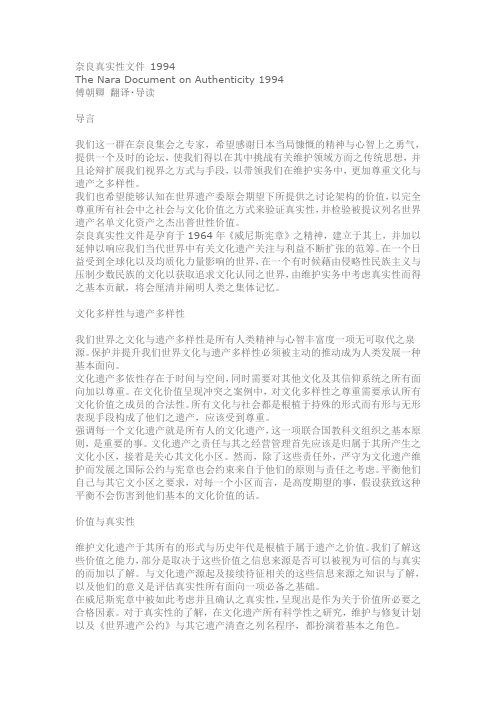
奈良真实性文件1994The Nara Document on Authenticity 1994傅朝卿翻译‧导读导言我们这一群在奈良集会之专家,希望感谢日本当局慷慨的精神与心智上之勇气,提供一个及时的论坛,使我们得以在其中挑战有关维护领域方而之传统思想,并且论辩扩展我们视界之方式与手段,以带领我们在维护实务中,更加尊重文化与遗产之多样性。
我们也希望能够认知在世界遗产委原会期望下所提供之讨论架构的价值,以完全尊重所有社会中之社会与文化价值之方式来验证真实性,并检验被提议列名世界遗产名单文化资产之杰出普世性价值。
奈良真实性文件是孕育于1964年《威尼斯宪章》之精神,建立于其上,并加以延伸以响应我们当代世界中有关文化遗产关注与利益不断扩张的范筹。
在一个日益受到全球化以及均质化力量影响的世界,在一个有时候藉由侵略性民族主义与压制少数民族的文化以获取追求文化认同之世界,由维护实务中考虑真实性而得之基本贡献,将会厘清并阐明人类之集体记忆。
文化多样性与遗产多样性我们世界之文化与遗产多样性是所有人类精神与心智丰富度一项无可取代之泉源。
保护并提升我们世界文化与遗产多样性必须被主动的推动成为人类发展一种基本面向。
文化遗产多依性存在于时间与空间,同时需要对其他文化及其信仰系统之所有面向加以尊重。
在文化价值呈现冲突之案例中,对文化多样性之尊重需要承认所有文化价值之成员的合法性。
所有文化与社会都是根植于持殊的形式而有形与无形表现手段构成了他们之遗产,应该受到尊重。
强调每一个文化遗产就是所有人的文化遗产,这一项联合国教科文组织之基本原则,是重要的事。
文化遗产之责任与其之经营管理首先应该是归属于其所产生之文化小区,接着是关心其文化小区。
然而,除了这些责任外,严守为文化遗产维护而发展之国际公约与宪章也会约束来自于他们的原则与责任之考虑。
平衡他们自己与其它文小区之要求,对每一个小区而言,是高度期望的事,假设获致这种平衡不会伤害到他们基本的文化价值的话。
奈良真实性文件

4. 在奈良文件之后,不少地区和国家的相关机构都结合当地特 点,讨论出台了关于如何定义和保护真实性的文件,其中包括 《圣安东尼奥宣言》,这一宣言强调了美洲文化遗产的特点,把 真实性与文化遗产的历史环境、人文背景,以及弱势群体等方面 联系起来,并提出具体的保护建议。除此之外,《圣安东尼奥宣 言》还对《奈良真实性文件》加以评价,认为其中一些建议和原 则并不适用于美洲文化遗产的实际情况。
3价值和真实性
对各种类型和各个历史时期的文化遗产的保护,根植于遗产
自身的价值。我们对这些价值的理解能力,部分依赖于用于理解
这些价值的信息源的可信性与真实性程度。对这些信息源的认识
和理解,与文化遗产原初的和后续的特征有关,是评价遗产原真
性所有内容的必要基础。
原真性,如按照上述方式思考并得到《威尼斯宪章》认可,看来 是评审遗产价值的本质因素。对原真性的理解,在文化遗产的所 有科研中,在保护与修复规划中,也在《世界遗产公约》和其它
信息源:是指使认识文化遗产的性质、特性、涵义和历史成为 可能的,一切物质型、文字型、口头型和图象型来源。
内容分析
1《奈良原真性文件》包含着专家们深入思考的成果。世界遗产委员会注 意到,专家们对于原真性作为界定、评估和监测文化遗产的一个本质要素, 具有普遍的认识一致性。专家们特别关注考察世界的文化多样性及这种多 样性的许许多多表达方式,从古迹、遗址,到文化景观,到非物质遗产。 最为重要的是,当真实性涉及文化遗产时,这一概念的应用应根植于特 定的文化环境中,并应得到相应的考虑。
奈良真实性文件
1994年ICOMOS(国际古迹遗址理事会)在日本奈良开会,通过了 关于遗产真实性的《奈良真实性文件》。
1、文件提纲挈领的阐述了多样性的重要意义,以及遗产真实性的 考察原则。提出"必须在相关文化背景下对遗产项目加以考虑和评 判"。文件不涉及到任何具体的措施和方针。
从历史观角度理解“原真性”
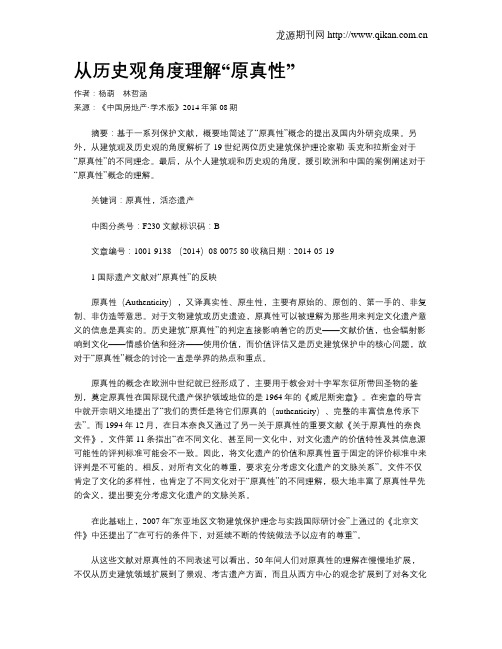
从历史观角度理解“原真性”作者:杨萌林哲涵来源:《中国房地产·学术版》2014年第08期摘要:基于一系列保护文献,概要地简述了“原真性”概念的提出及国内外研究成果。
另外,从建筑观及历史观的角度解析了19世纪两位历史建筑保护理论家勒·丢克和拉斯金对于“原真性”的不同理念。
最后,从个人建筑观和历史观的角度,援引欧洲和中国的案例阐述对于“原真性”概念的理解。
关键词:原真性,活态遗产中图分类号:F230 文献标识码:B文章编号:1001-9138-(2014)08-0075-80 收稿日期:2014-05-191 国际遗产文献对“原真性”的反映原真性(Authenticity),又译真实性、原生性,主要有原始的、原创的、第一手的、非复制、非仿造等意思。
对于文物建筑或历史遗迹,原真性可以被理解为那些用来判定文化遗产意义的信息是真实的。
历史建筑“原真性”的判定直接影响着它的历史——文献价值,也会辐射影响到文化——情感价值和经济——使用价值,而价值评估又是历史建筑保护中的核心问题,故对于“原真性”概念的讨论一直是学界的热点和重点。
原真性的概念在欧洲中世纪就已经形成了,主要用于教会对十字军东征所带回圣物的鉴别,奠定原真性在国际现代遗产保护领域地位的是1964年的《威尼斯宪章》。
在宪章的导言中就开宗明义地提出了“我们的责任是将它们原真的(authenticity)、完整的丰富信息传承下去”。
而1994年12月,在日本奈良又通过了另一关于原真性的重要文献《关于原真性的奈良文件》,文件第11条指出“在不同文化、甚至同一文化中,对文化遗产的价值特性及其信息源可能性的评判标准可能会不一致。
因此,将文化遗产的价值和原真性置于固定的评价标准中来评判是不可能的。
相反,对所有文化的尊重,要求充分考虑文化遗产的文脉关系”。
文件不仅肯定了文化的多样性,也肯定了不同文化对于“原真性”的不同理解,极大地丰富了原真性早先的含义,提出要充分考虑文化遗产的文脉关系。
国宝薬师寺东塔保存修理见学会のご案内
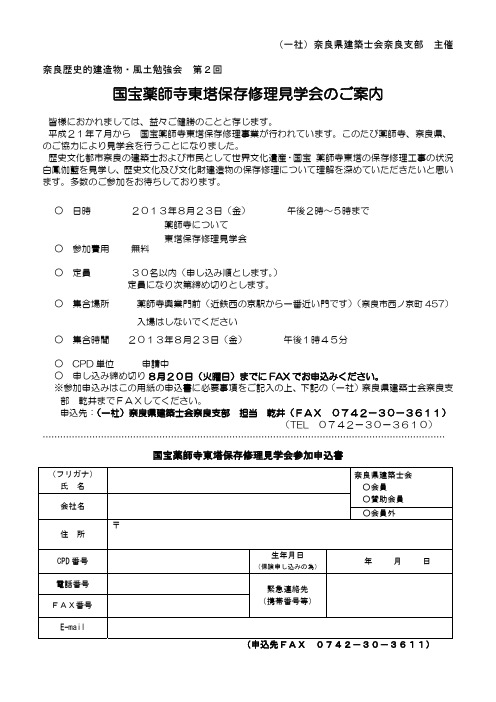
(一社)奈良県建築士会奈良支部 主催 奈良歴史的建造物・風土勉強会 第2回国宝薬師寺東塔保存修理見学会のご案内皆様におかれましては、益々ご健勝のことと存じます。
平成21年7月から 国宝薬師寺東塔保存修理事業が行われています。
このたび薬師寺、奈良県、のご協力により見学会を行うことになりました。
歴史文化都市奈良の建築士および市民として世界文化遺産・国宝 薬師寺東塔の保存修理工事の状況白鳳伽藍を見学し、歴史文化及び文化財建造物の保存修理について理解を深めていただきたいと思います。
多数のご参加をお待ちしております。
○ 日時 2013年8月23日(金) 午後2時~5時まで薬師寺について東塔保存修理見学会○ 参加費用 無料○ 定員 30名以内(申し込み順とします。
)定員になり次第締め切りとします。
○ 集合場所 薬師寺興業門前(近鉄西の京駅から一番近い門です)(奈良市西ノ京町457)入場はしないでください○ 集合時間 2013年8月23日(金) 午後1時45分○ CPD単位 申請中○ 申し込み締め切り8月20日(火曜日)までにFAXでお申込みください。
※参加申込みはこの用紙の申込書に必要事項をご記入の上、下記の(一社)奈良県建築士会奈良支部 乾井までFAXしてください。
申込先:(一社)奈良県建築士会奈良支部 担当 乾井(FAX 0742-30-3611)(TEL 0742-30-3610)…………………………………………………………………………………………………………………………国宝薬師寺東塔保存修理見学会参加申込書(フリガナ) 氏 名 奈良県建築士会 ○会員○賛助会員会社名○会員外 住 所〒CPD番号生年月日(保険申し込みの為)年 月 日電話番号緊急連絡先(携帯番号等)FAX番号E-mail(申込先FAX 0742-30-3611)。
ビジネス文书(三) 资料

ご参考までに、弊社の会社案内など同封ご送付させていただきました。
なお、よろしければ、ご紹介のご名刺をいただきに参上いたしますので、ご連絡くださいますよう重ねてお願い申し上げます。
敬 具
添付書類:1会社案内パンフレット3部
売上高:7億円
従業員:10名
担当 :業務部長 森田 稔
3吉田物産株式会社
〒150-0000東京都 渋谷区 青山6-1-2
電話:03-3716-9042
資本金:1億4000万円
売上高:107億5000万円
従業員:120名
担当 :営業部長 山田 栄三
各社の特徴は、
①「インテックス」は中堅のインテリア関係の会社で、主として東北、北海道方面に実績を持っています。どちらかと言うと、家具に強いと言えましょう。
さて、S&AのH.G.スミス氏をご紹介申し上げます。同氏は、このほどS&Aの日本支社長として赴任されました。スミス氏と私とはアメリカ駐在当時からの知人で、米国では家族ぐるみの付き合いをしていました。
S&A社は、カーペットの製造、販売で著名な会社で、最近新しいカーペットを日本市場で拡販するあたり、東京に直轄の支社を設けることになりました。しかし、先日、スミス氏より、日本での知名度が低いため、提携先を求めたいとの相談を受けました。そこで、支店網も充実し実力のある貴社を紹介させていただきました。
その節お話申し上げましたが、弊社は、インテリア、特にカーペットの新製品「デュクロン」の極東での販売拡大を当面の全社的目標としております。
この間、調査・検討の結果、現在弊社としては、有力な新規取引先として吉田物産とカーペットの取引先を望んで参りました。実は、吉田物産の山田営業部長とは、貴社のシスコのパーティの席上で名刺交換をしたことがあります。ただ、あまり深いお付き合いはありませんでした。
日军侵华主要战役战斗兵力编成及作战经过概要

日军侵华主要战役战斗兵力编成及作战经过概要发布: 2009-3-09 18:05 | 提交者: 橡皮筋| 来源: 春秋中文社区1、侵占平津地区的作战(1937年7月7日至8月4日)指挥官香月清司中将。
兵力编成:第20师团、独立混成第1、11旅团、中国驻屯步兵旅团、海、空军各一部。
第20师团师团长川岸文三郎中将,下辖:步兵第39旅团旅团长高木义人少将:步兵第77联队联队长鲤登行一大佐、步兵第78联队联队长少林恒一大佐。
步兵第40旅团旅团长山下奉文少将:步兵第79联队联队长森木伊市郎大佐、步兵第80联队联队长铃木谦二大佐。
骑兵第28联队联队长冈崎正一中佐、野炮兵第26联队联队长细川中康大佐、工兵第20联队联队长南部薰大佐、轻重兵第20联队联队长加藤权大佐。
独立混成第1旅团旅团长酒井镐次少将。
下辖独立步兵第1联队联队长谷川美代次大佐、独立野炮兵第1大队大队长中岛继三少佐、独立工兵第1中队中队长吉富敏男少佐、战车第4大队大队长村井俊雄大佐。
独立混成第11旅团旅团长铃木重康中将,下辖独立步兵第11联队联队长麦仓俊三郎大佐、独立步兵第12联队联队长奈良晃大佐、独立骑兵第11中队中队长森泽虎归少佐、独立野炮兵第11联队联队长入江莞尔中佐、独立山饱兵第12联队联队长冢本善太郎中佐、独立工兵第11中队中队长村上润大尉、独立轻重兵第11中队中队长小出龙勇少佐。
中国驻屯步兵旅团:旅团长河边正三少将,下辖中国驻屯步兵第1联队联队长牟田口廉大佐、中国驻屯步兵第2联队联队长萱鸠高大佐。
中国驻屯军直辖部队:中国驻屯骑兵队队长野口钦一少佐、中同驻屯炮兵联队联队长铃木率道大佐、中国驻屯工兵队队长大贺久茂次少佐、中国获屯战车队队长福田峰雄大佐。
作战经过概要:1937年7月7日夜,日军中国驻屯步兵旅团第1联队第3大队在北平时近的芦沟桥一带演习,声称有士兵一人“失踪”,即向中国军队驻守的宛平县城外卢沟桥发动进攻。
制造了全面武装侵略中国的“卢沟桥事变”。
(完整版)奈良文件概要
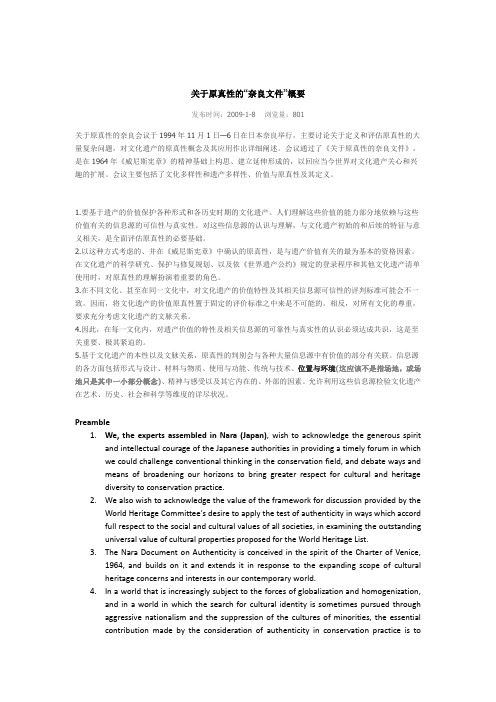
关于原真性的“奈良文件”概要发布时间:2009-1-8 浏览量:801关于原真性的奈良会议于1994年11月1日—6日在日本奈良举行,主要讨论关于定义和评估原真性的大量复杂问题,对文化遗产的原真性概念及其应用作出详细阐述。
会议通过了《关于原真性的奈良文件》,是在1964年《威尼斯宪章》的精神基础上构思、建立延伸形成的,以回应当今世界对文化遗产关心和兴趣的扩展。
会议主要包括了文化多样性和遗产多样性、价值与原真性及其定义。
1.要基于遗产的价值保护各种形式和各历史时期的文化遗产。
人们理解这些价值的能力部分地依赖与这些价值有关的信息源的可信性与真实性。
对这些信息源的认识与理解,与文化遗产初始的和后续的特征与意义相关,是全面评估原真性的必要基础。
2.以这种方式考虑的、并在《威尼斯宪章》中确认的原真性,是与遗产价值有关的最为基本的资格因素。
在文化遗产的科学研究、保护与修复规划、以及依《世界遗产公约》规定的登录程序和其他文化遗产清单使用时,对原真性的理解扮演着重要的角色。
3.在不同文化、甚至在同一文化中,对文化遗产的价值特性及其相关信息源可信性的评判标准可能会不一致。
因而,将文化遗产的价值原真性置于固定的评价标准之中来是不可能的。
相反,对所有文化的尊重,要求充分考虑文化遗产的文脉关系。
4.因此,在每一文化内,对遗产价值的特性及相关信息源的可靠性与真实性的认识必须达成共识,这是至关重要、极其紧迫的。
5.基于文化遗产的本性以及文脉关系,原真性的判别会与各种大量信息源中有价值的部分有关联。
信息源的各方面包括形式与设计、材料与物质、使用与功能、传统与技术、位置与环境(这应该不是指场地,或场地只是其中一小部分概念)、精神与感受以及其它内在的、外部的因素。
允许利用这些信息源检验文化遗产在艺术、历史、社会和科学等维度的详尽状况。
Preamble1.We, the experts assembled in Nara (Japan), wish to acknowledge the generous spiritand intellectual courage of the Japanese authorities in providing a timely forum in which we could challenge conventional thinking in the conservation field, and debate ways and means of broadening our horizons to bring greater respect for cultural and heritage diversity to conservation practice.2.We also wish to acknowledge the value of the framework for discussion provided by theWorld Heritage Committee's desire to apply the test of authenticity in ways which accord full respect to the social and cultural values of all societies, in examining the outstanding universal value of cultural properties proposed for the World Heritage List.3.The Nara Document on Authenticity is conceived in the spirit of the Charter of Venice,1964, and builds on it and extends it in response to the expanding scope of cultural heritage concerns and interests in our contemporary world.4.In a world that is increasingly subject to the forces of globalization and homogenization,and in a world in which the search for cultural identity is sometimes pursued through aggressive nationalism and the suppression of the cultures of minorities, the essential contribution made by the consideration of authenticity in conservation practice is toclarify and illuminate the collective memory of humanity.Cultural Diversity and Heritage Diversity5.The diversity of cultures and heritage in our world is an irreplaceable source of spiritualand intellectual richness for all humankind. The protection and enhancement of cultural and heritage diversity in our world should be actively promoted as an essential aspect of human development.6.Cultural heritage diversity exists in time and space, and demands respect for othercultures and all aspects of their belief systems. In cases where cultural values appear to be in conflict, respect for cultural diversity demands acknowledgment of the legitimacy of the cultural values of all parties.7.All cultures and societies are rooted in the particular forms and means of tangible andintangible expression which constitute their heritage, and these should be respected.8.It is important to underline a fundamental principle of UNESCO, to the effect that thecultural heritage of each is the cultural heritage of all. Responsibility for cultural heritage and the management of it belongs, in the first place, to the cultural community that has generated it, and subsequently to that which cares for it. However, in addition to these responsibilities, adherence to the international charters and conventions developed for conservation of cultural heritage also obliges consideration of the principles and responsibilities flowing from them. Balancing their own requirements with those of other cultural communities is, for each community, highly desirable, provided achieving this balance does not undermine their fundamental cultural values.Values and authenticity9.Conservation of cultural heritage in all its forms and historical periods is rooted in thevalues attributed to the heritage. Our ability to understand these values depends, in part, on the degree to which information sources about these values may be understood as credible or truthful. Knowledge and understanding of these sources of information, in relation to original and subsequent characteristics of the cultural heritage, and their meaning, is a requisite basis for assessing all aspects of authenticity.10.Authenticity, considered in this way and affirmed in the Charter of Venice, appears as theessential qualifying factor concerning values. The understanding of authenticity plays a fundamental role in all scientific studies of the cultural heritage, in conservation and restoration planning, as well as within the inscription procedures used for the World Heritage Convention and other cultural heritage inventories.11.All judgements about values attributed to cultural properties as well as the credibility ofrelated information sources may differ from culture to culture, and even within the same culture. It is thus not possible to base judgements of values and authenticity within fixed criteria. On the contrary, the respect due to all cultures requires that heritage properties must considered and judged within the cultural contexts to which they belong.12.Therefore, it is of the highest importance and urgency that, within each culture,recognition be accorded to the specific nature of its heritage values and the credibility and truthfulness of related information sources.13.Depending on the nature of the cultural heritage, its cultural context, and its evolutionthrough time, authenticity judgements may be linked to the worth of a great variety of sources of information. Aspects of the sources may include form and design, materialsand substance, use and function, traditions and techniques, location and setting, and spirit and feeling, and other internal and external factors. The use of these sources permits elaboration of the specific artistic, historic, social, and scientific dimensions of the cultural heritage being examined.Appendix 1Suggestions for follow-up (proposed by H. Stovel)1.Respect for cultural and heritage diversity requires conscious efforts to avoid imposingmechanistic formulae or standardized procedures in attempting to define or determine authenticity of particular monuments and sites.2.Efforts to determine authenticity in a manner respectful of cultures and heritagediversity requires approaches which encourage cultures to develop analytical processes and tools specific to their nature and needs. Such approaches may have several aspects in common:o efforts to ensure assessment of authenticity involve multidisciplinary collaboration and the appropriate utilisation of all available expertise andknowledge;o efforts to ensure attributed values are truly representative of a culture and the diversity of its interests, in particular monuments and sites;o efforts to document clearly the particular nature of authenticity for monuments and sites as a practical guide to future treatment and monitoring;o efforts to update authenticity assessments in light of changing values and circumstances.3.Particularly important are efforts to ensure that attributed values are respected, and thattheir determination included efforts to build, ad far as possible, a multidisciplinary and community consensus concerning these values.4.Approaches should also build on and facilitate international co-operation among allthose with an interest in conservation of cultural heritage, in order to improve global respect and understanding for the diverse expressions and values of each culture.5.Continuation and extension of this dialogue to the various regions and cultures of theworld is a prerequisite to increasing the practical value of consideration of authenticity in the conservation of the common heritage of humankind..6.Increasing awareness within the public of this fundamental dimension of heritage is anabsolute necessity in order to arrive at concrete measures for safeguarding the vestiges of the past. This means developing greater understanding of the values represented by the cultural properties themselves, as well as respecting the role such monuments and sites play in contemporary society.Appendix IIDefinitionsConservation: all efforts designed to understand cultural heritage, know its history and meaning, ensure its material safeguard and, as required, its presentation, restoration and enhancement.(Cultural heritage is understood to include monuments, groups of buildings and sites of cultural value as defined in article one of the World Heritage Convention).Information sources: all material, written, oral and figurative sources which make it possible to know the nature, specifications, meaning and history of the cultural heritage.The Nara Document on Authenticity was drafted by the 45 participants at the Nara Conference on Authenticity in Relation to the World Heritage Convention, held at Nara, Japan, from 1-6 November 1994, at the invitation of the Agency for Cultural Affairs (Government of Japan) and the Nara Prefecture. The Agency organized the Nara Conference in cooperation with UNESCO, ICCROM and ICOMOS.This final version of the Nara Document has been edited by the general rapporteurs of the Nara Conference, Mr. Raymond Lemaire and Mr. Herb Stovel.。
实施保护世界文化与自然遗产公约操作指南中关于

附件3:《实施保护世界文化与自然遗产公约操作指南》中关于预备名单的内容II.C 《预备名录》程序和格式62.《预备名录》是缔约国认为其境内具备世界遗产资格的遗产的详细目录,其中应包括其认为具有突出的普遍价值的文化和/或自然遗产的名字和今后几年内要申报的遗产的名字。
《保护世界文化与自然遗产公约》第1、2及11(1)条规定。
63.如果缔约国提交的申报遗产未曾列入该国的《预备名录》,委员会不予考虑。
第24COM VI.2.3.2号决定64.鼓励缔约国编撰其《预备名录》,并让景点管理人员、当地和地区政府、社区、非政府组织以及其他相关机构参与编撰过程。
65.缔约国呈报《预备名录》至秘书处的时间最好提前申报遗产一年。
委员会鼓励缔约国至少每十年重新审查或递交其《预备名录》。
66.缔约国需要递交英文或法语的《预备名录》,且采用附件2所示的标准格式,其中包括遗产名称、地理位置、简短描述以及其具有突出的普遍价值的陈述。
67.缔约国应将已签名的完整《预备名录》原件递交至:联合国教科文组织世界遗产中心法国巴黎(7, place de Fontenoy,Paris 07 SP,France)电话:+33 (0) 1 4568 1136电邮: wh-tentativelists@68.如果所有信息均已提供,秘书处会将《预备名录》登记并转呈给相关咨询团体。
每年都要向委员会递交所有《预备名录》的概要。
秘书处与相关缔约国协商,更新其记录,将《预备名录》上已纳入《世界遗产名录》和已拒绝申报除名。
第 4A号决定69.登录/en/tentativelists,查阅缔约国《预备名录》:第27COM 8A号决定《预备名录》作为计划与评估工具70.《预备名录》提供未来遗产名录申报信息,是缔约国、世界遗产委员会、秘书处及咨询团体有用的重要计划工具。
71.鼓励缔约国参考国际古迹遗址理事会(ICOMOS)和世界保护自然联盟(IUCN) 应委员会要求准备的《世界遗产名录》和《预备名录》的分析报告,确定《世界遗产名录》内的空白。
奈良公园主要景点-概述说明以及解释

奈良公园主要景点-概述说明以及解释1.引言1.1 概述奈良公园是日本著名的历史景点之一,位于奈良市中心,是世界遗产奈良历史古迹的一部分。
该公园为游客提供了一个独特的机会,可以近距离接触日本古代历史与文化。
在这片美丽的园区内,游客可以欣赏到许多古老的建筑和寺庙,还可以与鹿群亲密接触。
本文将介绍奈良公园的主要景点,带领读者探索这座古老公园的魅力。
1.2 文章结构:本文主要分为三个部分,分别是引言、正文和结论。
在引言部分,将会对奈良公园进行概述,介绍文章的结构和目的,为读者提供一个整体的认识。
在正文部分,将会详细介绍奈良公园的历史,主要景点以及文化意义。
通过对各个方面的介绍,读者可以更加全面地了解奈良公园的特色和价值。
在结论部分,将对奈良公园的重要性进行总结,展望未来发展方向,并以一定的结语结束全文,为读者留下深刻的印象。
1.3 目的本文的目的是为读者提供关于奈良公园主要景点的详细信息,让读者了解奈良公园的历史、主要景点及文化意义。
通过本文,读者可以了解奈良公园作为日本历史悠久的公园之一的重要地位,以及其承载的丰富文化传统和精神内涵。
我们希望读者通过阅读本文,更加深入地了解奈良公园的价值和意义,从而增进对日本文化和历史的了解,以及对奈良公园的独特魅力有更深入的体会。
2.正文2.1 奈良公园的历史奈良公园的历史可以追溯到奈良时代(710-794年),当时日本首都设在奈良,这个时期也被称为平安时代。
奈良公园作为当时皇家宫廷的花园,是一个为皇室提供休憩和游览的场所。
公园内的建筑和景观都是根据当时的宫廷风格和文化特色进行设计的。
奈良公园的规划和建设受到了中国唐朝文化的影响,体现了日本和中国文化的交流和融合。
公园内的建筑和园林景观都展现了当时日本的宫廷文化和园林艺术的独特魅力。
随着时代的变迁,奈良公园的功能逐渐转变为一个开放的公共空间,供市民和游客参观游玩。
今天的奈良公园依然保留着古代文化遗产的痕迹,成为了日本历史文化的代表性景点之一。
遣唐使和奈良文化的形成
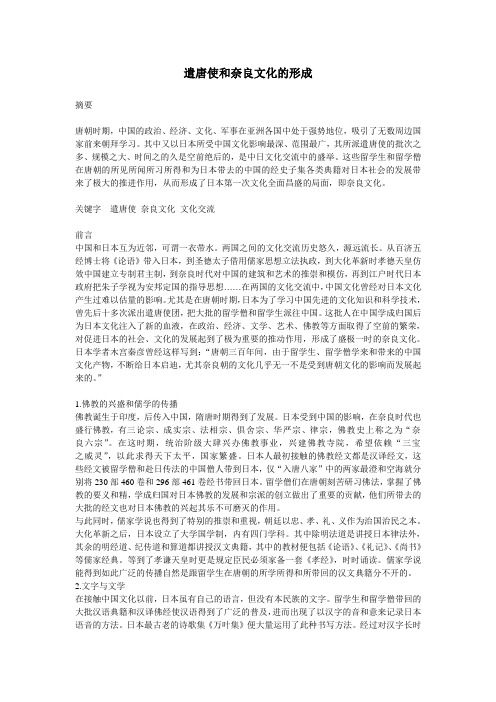
遣唐使和奈良文化的形成摘要唐朝时期,中国的政治、经济、文化、军事在亚洲各国中处于强势地位,吸引了无数周边国家前来朝拜学习。
其中又以日本所受中国文化影响最深、范围最广,其所派遣唐使的批次之多、规模之大、时间之的久是空前绝后的,是中日文化交流中的盛举。
这些留学生和留学僧在唐朝的所见所闻所习所得和为日本带去的中国的经史子集各类典籍对日本社会的发展带来了极大的推进作用,从而形成了日本第一次文化全面昌盛的局面,即奈良文化。
关键字遣唐使奈良文化文化交流前言中国和日本互为近邻,可谓一衣带水。
两国之间的文化交流历史悠久,源远流长。
从百济五经博士将《论语》带入日本,到圣德太子借用儒家思想立法执政,到大化革新时孝德天皇仿效中国建立专制君主制,到奈良时代对中国的建筑和艺术的推崇和模仿,再到江户时代日本政府把朱子学视为安邦定国的指导思想……在两国的文化交流中,中国文化曾经对日本文化产生过难以估量的影响。
尤其是在唐朝时期,日本为了学习中国先进的文化知识和科学技术,曾先后十多次派出遣唐使团,把大批的留学僧和留学生派往中国。
这批人在中国学成归国后为日本文化注入了新的血液,在政治、经济、文学、艺术、佛教等方面取得了空前的繁荣,对促进日本的社会、文化的发展起到了极为重要的推动作用,形成了盛极一时的奈良文化。
日本学者木宫秦彦曾经这样写到:“唐朝三百年间,由于留学生、留学僧学来和带来的中国文化产物,不断给日本启迪,尤其奈良朝的文化几乎无一不是受到唐朝文化的影响而发展起来的。
”1.佛教的兴盛和儒学的传播佛教诞生于印度,后传入中国,隋唐时期得到了发展。
日本受到中国的影响,在奈良时代也盛行佛教,有三论宗、成实宗、法相宗、俱舍宗、华严宗、律宗,佛教史上称之为“奈良六宗”。
在这时期,统治阶级大肆兴办佛教事业,兴建佛教寺院,希望依赖“三宝之威灵”,以此求得天下太平,国家繁盛。
日本人最初接触的佛教经文都是汉译经文,这些经文被留学僧和赴日传法的中国僧人带到日本,仅“入唐八家”中的两家最澄和空海就分别将230部460卷和296部461卷经书带回日本。
矛盾纠纷排查化解方案(完整版)

矛盾纠纷排查化解方案(完整版)为切实维护社会稳定,机关各股室及委属各单位必须进一步加强矛盾纠纷排查化解工作,努力从源头上化解社会矛盾,营造和谐的社会环境。
一、进一步加大矛盾纠纷排查调处机制建设1.强化非政府领导。
各股室各单位负责同志必须高度重视矛盾纠纷排查调解工作,不懈努力从源头上解决社会矛盾。
分管领导必须集中精力狠抓工作部署全面落实,保证该工作有人管,有人揪。
2.要健全工作网络。
完善排调工作网络,充实基层排调力量,做到排调力量横向到边,纵向到底分布,真正实现全覆盖。
3.建设台帐一体化制度。
各单位必须按时呈报摸底表中(各半月一次)并搞好归属于帐存底。
二、进一步加大重点突出矛盾纠纷排查工作各单位必须利用五天时间,实行分散排查和重点排查结合的方式展开。
纵向到边,横向到底的全面排查,并创建台帐。
推行“四的定三包”,即定会同领导,的定责任单位,的定责任人,的定解决时限,纸盒调解,纸盒追踪,纸盒意见反馈。
二就是定期排查和翻转排查结合,按规定时限呈报综治办。
三、进一步加大矛盾纠纷调处化解力度1、对已经排查出的矛盾纠纷必须秉持谁主管谁负责管理的原则,展开深入细致分析,制订切实有效的调解措施,明晰调解责任人,明确提出解决时限。
2、要运用人民调解,行政调解司法调解联动机制,化解矛盾纠纷。
3、必须全面落实追踪问责,对解决了的纠纷必须及时销案。
对未解决的纠纷必须展开深入分析,明确提出代莱解决措施,对横跨区域跨行业的矛盾纠纷,可以报告上一级综治部门协同化解。
四、进一步加大矛盾纠纷排查调处督查督办力度1.创建考核考核联动机制。
2.工信委综治办将抽调人员组成督查组定期或不定期对各股室、委属各单位的工作开展情况进行督查,并将结果进行通报。
附赠:矛盾纠纷联防联调工作方案边界地区平衡就是社会平衡的关键组成部分,解决边界矛盾纠纷,就是时代剥夺司法行政机关和人民调解非政府义不容辞的责任。
今年6月27日省司法厅联手省司法厅在省市举行了边界矛盾纠纷共管调试工作第一届年会。
奈良女大资料
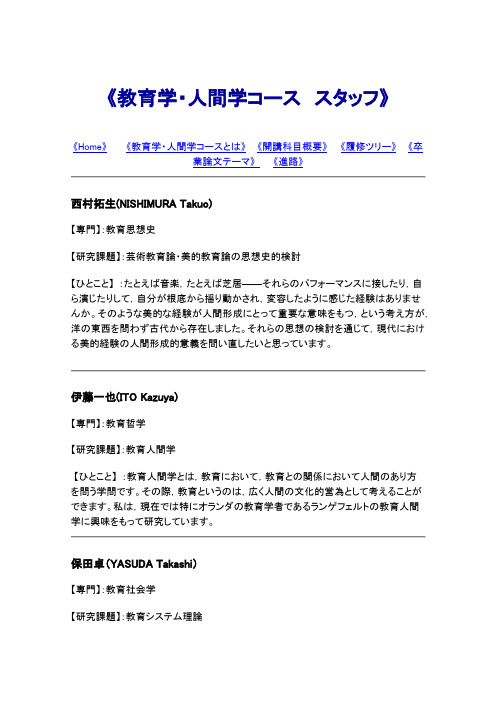
【専門】:身体文化学
【研究課題】:近代日本の身体文化・大衆文化論、ユースカルチャーの社会史
【ひとこと】:近代日本を「身体」という視点で切り取ると何が見えてくるでしょうか。既存の学問では見えなかったさまざまな領野の思わぬつながりが見えてきます。遊び、健康、スポーツはもちろん文学、思想、政治、経済からマンガや音楽まで。歴史学、社会学の方法を援用しながら、こうした多様な領野を横断し、文化史、社会史、思想史的な研究を行っています。
日本教育学会
日本心理学会
日本発達心理学会
日本社会心理学会
日本人間工学会
日本生理学会
日本子ども社会学会
日本教育心理学会
日本質的心理学会
スポーツ史学会
日本哲学会
日本倫理学会
【関連の学位論文】
授与
年度
氏 名
論 文 題 目
学位の種類又は
専攻分野の名称
平21
矢野 憲子
初期言語発達における声と意味
―ジャルゴンとひとり言―
《開講科目概要》
《Home》《教育学・人間学コースとは》《スタッフ》《履修ツリー》《卒業論文テーマ》《進路》
~~こんな授業があります~~
平成23年度の授業から
担当教員
【子ども史特殊研究】
前半では、近年の子ども史、社会史、教育史の成果の紹介を通じて、「子ども」という存在や「教育」という営みの自明性が歴史的に如何に形成されてきたのかを明らかにする。後半では、そのような自明性へのオルタナティブを追求する試みとして、本学附属小学校とシュタイナー学校について検討する。
【身体教育学特殊研究】
本年度は、「パフォーマンスする身体の政治学」について講義を行なう。ヴィジュアル・メディアの全盛時代に、われわれは、常に誰かの「身体」を見つめている。それは、電車で隣り合う人の場合もあれば、テレビで演説する政治家の場合もあり、また、スマートフォンで見る歌い踊るスーパースターの場合もある。あなたは、電車で黒人が隣に座った時に、瞬間的に何を感じるだろうか。そこにはすでに「身体の政治学」が作動しているのだ。本講義では、とくに、アメリカのブラック・カルチャーに注目し、1960年代以降を中心にその歴史を多ぢ降りながら、黒人パフォーマーたちが人前にさらしている「黒い身体」が社会的にどのような意味を持ち、また、人々の何を変容してきたのかについて考察したい。
奈良真实性文件
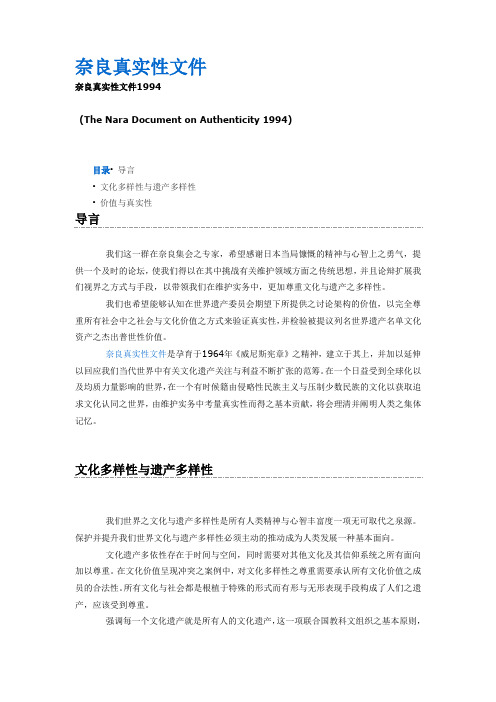
奈良真实性文件奈良真实性文件1994(The Nara Document on Authenticity 1994)目录•导言•文化多样性与遗产多样性•价值与真实性导言我们这一群在奈良集会之专家,希望感谢日本当局慷慨的精神与心智上之勇气,提供一个及时的论坛,使我们得以在其中挑战有关维护领域方面之传统思想,并且论辩扩展我们视界之方式与手段,以带领我们在维护实务中,更加尊重文化与遗产之多样性。
我们也希望能够认知在世界遗产委员会期望下所提供之讨论架构的价值,以完全尊重所有社会中之社会与文化价值之方式来验证真实性,并检验被提议列名世界遗产名单文化资产之杰出普世性价值。
奈良真实性文件是孕育于1964年《威尼斯宪章》之精神,建立于其上,并加以延伸以回应我们当代世界中有关文化遗产关注与利益不断扩张的范筹。
在一个日益受到全球化以及均质力量影响的世界,在一个有时候籍由侵略性民族主义与压制少数民族的文化以获取追求文化认同之世界,由维护实务中考量真实性而得之基本贡献,将会理清并阐明人类之集体记忆。
文化多样性与遗产多样性我们世界之文化与遗产多样性是所有人类精神与心智丰富度一项无可取代之泉源。
保护并提升我们世界文化与遗产多样性必须主动的推动成为人类发展一种基本面向。
文化遗产多依性存在于时间与空间,同时需要对其他文化及其信仰系统之所有面向加以尊重。
在文化价值呈现冲突之案例中,对文化多样性之尊重需要承认所有文化价值之成员的合法性。
所有文化与社会都是根植于特殊的形式而有形与无形表现手段构成了人们之遗产,应该受到尊重。
强调每一个文化遗产就是所有人的文化遗产,这一项联合国教科文组织之基本原则,是重要的事。
文化遗产之责任与其经营管理首先应该是归属于其所产生之文化社区,接着是关心其文化社区。
然而,除了这些责任外,严守为文化遗产维护而发展之国际公约与宪章也会约束来自他们的原则与责任之考虑。
平衡他们自己与其他文化社区之要求,对每一个社区面言,是高度期望的事,假设获取这种平衡不会伤害到他们基本的文化价值的话。
奈良日语介绍 日语发表

あ り が と う ~
奈良
• • • •
紹介 奈良の鹿 世界遺産 伝統工芸
• 観光スポット • 名産品
紹介
• 奈良県は、世界的 に有名な古都であ り、歴史的な文化 遺産に恵まれたと ころです。 • ここは日本最古の 朝廷が置かれた土 地です。
奈良の鹿
「古都奈良の文化財」の概要
奈良に都がおかれたのは710年のことです。 それから1300年近くの時が流れた1998年の 12月、 京都で開かれた第22回世界遺産委員会で、 「古都奈良の文化財」の世界遺産リストへの登録が 決定しました。
ここでは、奈良を代表する伝統工芸品を 紹介します。
奈良筆
鹿角細工
• 鹿の角の製品
奈良一刀彫
中 野 美 術 館
大 和 文 華 館
松 伯 美 術 館
奈 良 市 美 術 館
南明寺
【なんみょうじ】
大安寺
芳徳寺
【ほうとくじ】
三松寺
奈良公園
奈良のうまいもの
奈良渍け
柿の葉寿司
茶粥
飛鳥鍋
葛料理
興福寺
猿沢池にうつる興福寺の五重塔は、奈良を代表する風景になっていま す。
春日大社
飛火野を右手にみて、石灯籠の並ぶ表参道を東にたどると、春日大 社南門に行きつきます。この地は、もと春日地方の地主神をまつっ ていたところです。
元興寺
元興寺は、蘇我馬子が飛鳥の地に建てたわが国最古の寺院、法興寺 (飛鳥寺)を平城京に移したものです。奈良時代の後半にはほぼ伽藍 を整えたとみられます。
薬師寺
日本で最も美しい薬師寺の東塔を詠んだ佐々木信綱の歌です。薬師寺は、 もと天武天皇の発願により持統天皇によって藤原京に建てられたもので す。
人文▎正倉院:古奈良的歷史遺跡

人文▎正倉院:古奈良的歷史遺跡日本正倉院,絲綢之路的終點。
日本正倉院即日本奈良東大寺內的正倉院,位於大佛殿西北面,建於公元八世紀中期的奈良時代,是用來保管寺內財寶的倉庫。
正倉院是聯合國教科文組織1998年發布的世界文化遺產“古奈良的歷史遺跡”的壹部分。
日本正倉院收藏有服飾、家具、樂器、玩具、兵器等各式各樣的寶物,總數約達9000件之多,其中壹半以上來自中國、朝鮮等國,最遠有來自波斯的寶物。
有壹種說法甚至認為,“正倉院是絲綢之路的終點”。
(王兹)皿南倉(王兹)皿南倉(王兹)皿南倉(王兹)鉢南倉在奈良和平安時代,中央和地方的官廳及寺院裏,都會專門設置壹個放置重要物品的倉庫,稱為“正倉”。
幾個正倉集中在壹起被稱為“正倉院”。
隨著歲月的流逝,很多地方的正倉蹤跡全無,唯有東大寺正倉院內的正倉壹棟還保留著原貌,這就是正倉院寶庫。
白葛箱北倉鞍褥中倉布作面南倉筆中倉白瑠璃碗中倉白石板北倉白瑠璃瓶中倉赤紫地水波魚鳥文纈絁南倉赤漆文欟木厨子北倉赤地唐花文錦赤地縞文纐纈布赤地目交文纐纈絁紺地目交文纐纈綾正仓院的陈列物是以圣武天皇的遗物为基础构成的。
圣武天皇于笃信佛教,他去世后,他的皇后光明皇太后将他遗爱之物分批呈献给东大寺卢舍那佛。
这些呈献物收藏在东大寺的仓库,是为正仓院。
到明治时代,整个正仓院连同宝物划归皇室专有,脱离东大寺,直接由宫内厅管理。
紫檀木画槽琵琶南仓東南院古文書第三櫃第三十三巻続修正倉院古文書第三十二巻北仓150 花氈磁塔残欠紅牙撥鏤尺杜家立成北倉刀子中倉刀子中倉瑇瑁螺鈿八?箱中倉磁鼓筒南倉花樹孔雀文刺繡胡禄+矢中倉楓蘇芳染螺鈿槽琵琶南倉黄金瑠璃鈿背十二稜鏡南倉現存的正倉院全部為木構建築,不用柱子,而是將三角形木材搭成“#”形並不斷疊加而成。
這裏的收藏品數量大,種類多。
目前,正倉院光是經過整理的文物就多達9000件,包含生活用品、書卷、文具、樂器、祭祀用品和武器等。
正倉院寶物很多都標有明確的使用年代和由來,為學術研究提供了寶貴的依據。
(完整版)日本园林发展
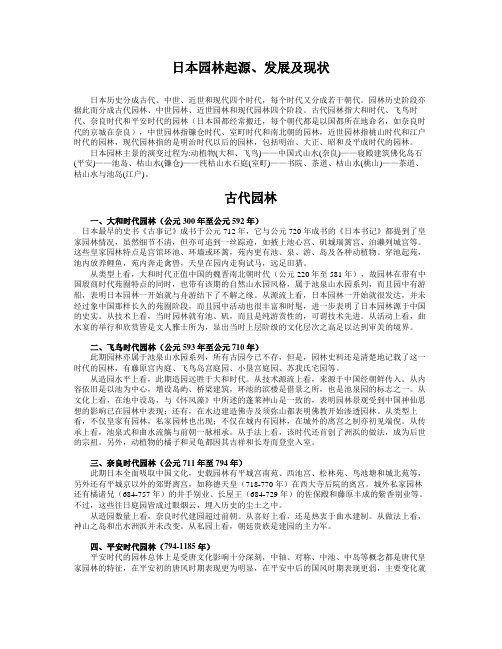
日本园林起源、发展及现状日本历史分成古代、中世、近世和现代四个时代,每个时代又分成若干朝代。
园林历史阶段亦据此而分成古代园林、中世园林、近世园林和现代园林四个阶段。
古代园林指大和时代、飞鸟时代、奈良时代和平安时代的园林(日本国都经常搬迁,每个朝代都是以国都所在地命名,如奈良时代的京城在奈良),中世园林指镰仓时代、室町时代和南北朝的园林,近世园林指桃山时代和江户时代的园林,现代园林指的是明治时代以后的园林,包括明治、大正、昭和及平成时代的园林。
日本园林主景的演变过程为:动植物(大和、飞鸟)——中国式山水(奈良)——寝殿建筑佛化岛石(平安)——池岛、枯山水(镰仓)——纯枯山水石庭(室町)——书院、茶道、枯山水(桃山)——茶道、枯山水与池岛(江户)。
古代园林一、大和时代园林(公元300年至公元592年)日本最早的史书《古事记》成书于公元712年,它与公元720年成书的《日本书记》都提到了皇家园林情况,虽然细节不清,但亦可追到一丝踪迹,如掖上池心宫、矶城瑞篱宫、泊濑列城宫等。
这些皇家园林特点是宫馆环池、环墙或环篱,苑内更有池、泉、游、岛及各种动植物。
穿池起苑,池内放养鲤鱼,苑内奔走禽兽,天皇在园内走狗试马,远足田猎。
从类型上看,大和时代正值中国的魏晋南北朝时代(公元220年至581年),故园林在带有中国殷商时代苑囿特点的同时,也带有该期的自然山水园风格,属于池泉山水园系列,而且园中有游船,表明日本园林一开始就与舟游结下了不解之缘。
从源流上看,日本园林一开始就很发达,并未经过象中国那样长久的苑囿阶段,而且园中活动也很丰富和时髦,进一步表明了日本园林源于中国的史实。
从技术上看,当时园林就有池、矶,而且是纯游赏性的,可谓技术先进。
从活动上看,曲水宴的举行和欣赏皆是文人雅士所为,显出当时上层阶级的文化层次之高足以达到审美的境界。
二、飞鸟时代园林(公元593年至公元710年)此期园林亦属于池泉山水园系列,所有古园今已不存,但是,园林史料还是清楚地记载了这一时代的园林,有藤原宫内庭、飞鸟岛宫庭园、小垦宫庭园、苏我氏宅园等。
- 1、下载文档前请自行甄别文档内容的完整性,平台不提供额外的编辑、内容补充、找答案等附加服务。
- 2、"仅部分预览"的文档,不可在线预览部分如存在完整性等问题,可反馈申请退款(可完整预览的文档不适用该条件!)。
- 3、如文档侵犯您的权益,请联系客服反馈,我们会尽快为您处理(人工客服工作时间:9:00-18:30)。
关于原真性的“奈良文件”概要发布时间:2009-1-8 浏览量:801关于原真性的奈良会议于1994年11月1日—6日在日本奈良举行,主要讨论关于定义和评估原真性的大量复杂问题,对文化遗产的原真性概念及其应用作出详细阐述。
会议通过了《关于原真性的奈良文件》,是在1964年《威尼斯宪章》的精神基础上构思、建立延伸形成的,以回应当今世界对文化遗产关心和兴趣的扩展。
会议主要包括了文化多样性和遗产多样性、价值与原真性及其定义。
1.要基于遗产的价值保护各种形式和各历史时期的文化遗产。
人们理解这些价值的能力部分地依赖与这些价值有关的信息源的可信性与真实性。
对这些信息源的认识与理解,与文化遗产初始的和后续的特征与意义相关,是全面评估原真性的必要基础。
2.以这种方式考虑的、并在《威尼斯宪章》中确认的原真性,是与遗产价值有关的最为基本的资格因素。
在文化遗产的科学研究、保护与修复规划、以及依《世界遗产公约》规定的登录程序和其他文化遗产清单使用时,对原真性的理解扮演着重要的角色。
3.在不同文化、甚至在同一文化中,对文化遗产的价值特性及其相关信息源可信性的评判标准可能会不一致。
因而,将文化遗产的价值原真性置于固定的评价标准之中来是不可能的。
相反,对所有文化的尊重,要求充分考虑文化遗产的文脉关系。
4.因此,在每一文化内,对遗产价值的特性及相关信息源的可靠性与真实性的认识必须达成共识,这是至关重要、极其紧迫的。
5.基于文化遗产的本性以及文脉关系,原真性的判别会与各种大量信息源中有价值的部分有关联。
信息源的各方面包括形式与设计、材料与物质、使用与功能、传统与技术、位置与环境(这应该不是指场地,或场地只是其中一小部分概念)、精神与感受以及其它内在的、外部的因素。
允许利用这些信息源检验文化遗产在艺术、历史、社会和科学等维度的详尽状况。
Preamble1.We, the experts assembled in Nara (Japan), wish to acknowledge the generous spiritand intellectual courage of the Japanese authorities in providing a timely forum in which we could challenge conventional thinking in the conservation field, and debate ways and means of broadening our horizons to bring greater respect for cultural and heritage diversity to conservation practice.2.We also wish to acknowledge the value of the framework for discussion provided by theWorld Heritage Committee's desire to apply the test of authenticity in ways which accord full respect to the social and cultural values of all societies, in examining the outstanding universal value of cultural properties proposed for the World Heritage List.3.The Nara Document on Authenticity is conceived in the spirit of the Charter of Venice,1964, and builds on it and extends it in response to the expanding scope of cultural heritage concerns and interests in our contemporary world.4.In a world that is increasingly subject to the forces of globalization and homogenization,and in a world in which the search for cultural identity is sometimes pursued through aggressive nationalism and the suppression of the cultures of minorities, the essential contribution made by the consideration of authenticity in conservation practice is toclarify and illuminate the collective memory of humanity.Cultural Diversity and Heritage Diversity5.The diversity of cultures and heritage in our world is an irreplaceable source of spiritualand intellectual richness for all humankind. The protection and enhancement of cultural and heritage diversity in our world should be actively promoted as an essential aspect of human development.6.Cultural heritage diversity exists in time and space, and demands respect for othercultures and all aspects of their belief systems. In cases where cultural values appear to be in conflict, respect for cultural diversity demands acknowledgment of the legitimacy of the cultural values of all parties.7.All cultures and societies are rooted in the particular forms and means of tangible andintangible expression which constitute their heritage, and these should be respected.8.It is important to underline a fundamental principle of UNESCO, to the effect that thecultural heritage of each is the cultural heritage of all. Responsibility for cultural heritage and the management of it belongs, in the first place, to the cultural community that has generated it, and subsequently to that which cares for it. However, in addition to these responsibilities, adherence to the international charters and conventions developed for conservation of cultural heritage also obliges consideration of the principles and responsibilities flowing from them. Balancing their own requirements with those of other cultural communities is, for each community, highly desirable, provided achieving this balance does not undermine their fundamental cultural values.Values and authenticity9.Conservation of cultural heritage in all its forms and historical periods is rooted in thevalues attributed to the heritage. Our ability to understand these values depends, in part, on the degree to which information sources about these values may be understood as credible or truthful. Knowledge and understanding of these sources of information, in relation to original and subsequent characteristics of the cultural heritage, and their meaning, is a requisite basis for assessing all aspects of authenticity.10.Authenticity, considered in this way and affirmed in the Charter of Venice, appears as theessential qualifying factor concerning values. The understanding of authenticity plays a fundamental role in all scientific studies of the cultural heritage, in conservation and restoration planning, as well as within the inscription procedures used for the World Heritage Convention and other cultural heritage inventories.11.All judgements about values attributed to cultural properties as well as the credibility ofrelated information sources may differ from culture to culture, and even within the same culture. It is thus not possible to base judgements of values and authenticity within fixed criteria. On the contrary, the respect due to all cultures requires that heritage properties must considered and judged within the cultural contexts to which they belong.12.Therefore, it is of the highest importance and urgency that, within each culture,recognition be accorded to the specific nature of its heritage values and the credibility and truthfulness of related information sources.13.Depending on the nature of the cultural heritage, its cultural context, and its evolutionthrough time, authenticity judgements may be linked to the worth of a great variety of sources of information. Aspects of the sources may include form and design, materialsand substance, use and function, traditions and techniques, location and setting, and spirit and feeling, and other internal and external factors. The use of these sources permits elaboration of the specific artistic, historic, social, and scientific dimensions of the cultural heritage being examined.Appendix 1Suggestions for follow-up (proposed by H. Stovel)1.Respect for cultural and heritage diversity requires conscious efforts to avoid imposingmechanistic formulae or standardized procedures in attempting to define or determine authenticity of particular monuments and sites.2.Efforts to determine authenticity in a manner respectful of cultures and heritagediversity requires approaches which encourage cultures to develop analytical processes and tools specific to their nature and needs. Such approaches may have several aspects in common:o efforts to ensure assessment of authenticity involve multidisciplinary collaboration and the appropriate utilisation of all available expertise andknowledge;o efforts to ensure attributed values are truly representative of a culture and the diversity of its interests, in particular monuments and sites;o efforts to document clearly the particular nature of authenticity for monuments and sites as a practical guide to future treatment and monitoring;o efforts to update authenticity assessments in light of changing values and circumstances.3.Particularly important are efforts to ensure that attributed values are respected, and thattheir determination included efforts to build, ad far as possible, a multidisciplinary and community consensus concerning these values.4.Approaches should also build on and facilitate international co-operation among allthose with an interest in conservation of cultural heritage, in order to improve global respect and understanding for the diverse expressions and values of each culture.5.Continuation and extension of this dialogue to the various regions and cultures of theworld is a prerequisite to increasing the practical value of consideration of authenticity in the conservation of the common heritage of humankind..6.Increasing awareness within the public of this fundamental dimension of heritage is anabsolute necessity in order to arrive at concrete measures for safeguarding the vestiges of the past. This means developing greater understanding of the values represented by the cultural properties themselves, as well as respecting the role such monuments and sites play in contemporary society.Appendix IIDefinitionsConservation: all efforts designed to understand cultural heritage, know its history and meaning, ensure its material safeguard and, as required, its presentation, restoration and enhancement.(Cultural heritage is understood to include monuments, groups of buildings and sites of cultural value as defined in article one of the World Heritage Convention).Information sources: all material, written, oral and figurative sources which make it possible to know the nature, specifications, meaning and history of the cultural heritage.The Nara Document on Authenticity was drafted by the 45 participants at the Nara Conference on Authenticity in Relation to the World Heritage Convention, held at Nara, Japan, from 1-6 November 1994, at the invitation of the Agency for Cultural Affairs (Government of Japan) and the Nara Prefecture. The Agency organized the Nara Conference in cooperation with UNESCO, ICCROM and ICOMOS.This final version of the Nara Document has been edited by the general rapporteurs of the Nara Conference, Mr. Raymond Lemaire and Mr. Herb Stovel.。
